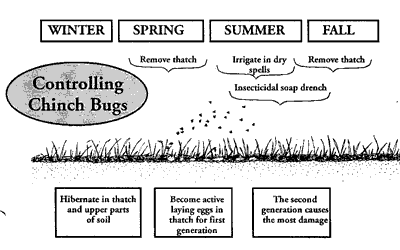Chinch bug treatment isn’t just about saving your lawn—it’s about making sure these pests know they’ve messed with the wrong turf. Learn how to get rid of chinch bugs and take back control.
 |
Control Chinch Bugs With Natural Insecticides
Controlling Modest Chinchbug Infestations
Chinch bug infestations can usually be controlled by pouring a neem oil soap product over affected turf areas (not over the entire lawn). Do not use on drought-stressed plants, bleeding hearts, crown of thorns, gardenia, horse chestnut, jade plant, Japanese maple, lantana, mountain ash, sweet peas or new growth on conifers. Please read and follow directions.
For Neem Oil Soap product information go to Yardener's Tool Shed.
AzaMax will control chinch bugs
AzaMax is a natural product with a broad spectrum of pest control and broad plant applications. AzaMax is an anti-feedant and insect growth regulator which control (kills) pests through starvation and growth disruption within two or three days. Therefore this product is used when the bugger is chomping on the foliage. Any of the sprayers can be used to apply AzaMax
For more information about AzaMax go to the Yardener's Tool Shed; click here
FAQ: Expert Tips for Chinch Bug Treatment and Lawn Care
How to get rid of chinch bugs and what kills chinch bugs effectively?
To tackle chinch bugs, first identify the severity of the infestation. For extreme cases, granular or liquid insecticides containing bifenthrin, trichlorfon, or carbaryl are recommended. These chemicals disrupt the pests' life cycle and kill them quickly.
Popular products include Ortho Max Bug-B-Gon and Bayer Advanced, both of which are easy to apply and widely available. If you prefer a natural option, a homemade soap spray can be equally effective for smaller infestations. Mix 1-2 tablespoons of mild liquid soap with a gallon of water and spray directly onto the affected areas. This solution suffocates chinch bugs while being safe for plants.
For ongoing chinch bug control, regular lawn maintenance is essential. Mow your lawn to the proper height, avoid overwatering, and apply appropriate fertilizers. Creating an unfavorable environment for chinch bugs can prevent future infestations. Additionally, monitoring your lawn for early signs of damage, such as yellow or brown patches, will allow you to act before the infestation spreads.
By combining targeted insecticides, natural remedies, and preventative measures, you can effectively eliminate chinch bugs and keep your lawn healthy year-round.
What is the best chinch bug killer and which chinch bug insecticide should I use?
The best chinch bug killer includes synthetic pyrethroids like bifenthrin, permethrin, and lambda-cyhalothrin, which effectively target pests during active months.
For smaller infestations, a natural chinch bug insecticide like neem oil can also work. Apply treatments in summer, follow label directions, and monitor your lawn for lasting control.
How does chinch bug control work, and what steps should I take?
Chinch bug control involves a combination of proper lawn care practices and targeted treatments to eliminate these pests and protect your turf. These bugs thrive in hot, dry conditions, so maintaining a healthy, hydrated lawn is the first defense.
For severe infestations, using effective insecticides is crucial for long-term control.
Steps for Effective Chinch Bug Control:
- Maintain Proper Lawn Care: Water your lawn weekly with about one inch of irrigation to prevent dry conditions that attract chinch bugs. Remove thatch to eliminate their hiding spots.
- Use a Reliable Insecticide: Apply a product like Ortho® BugClear™ Lawn Insect Killer to kill chinch bugs on contact and create a protective barrier for up to 3 months.
- Monitor and Follow Up: After the first application, reapply the treatment within 2–4 weeks to ensure complete elimination of the infestation.
Take action now by combining regular lawn care with targeted treatments to achieve successful chinch bug control and maintain a healthy, pest-free lawn.
Which insecticide for chinch bugs offers the fastest results?
For the fastest results, the best insecticide for chinch bugs includes synthetic pyrethroids like bifenthrin, permethrin, cyfluthrin, or lambda-cyhalothrin. These insecticides provide quick knockdown of active chinch bug populations within a few days, making them highly effective for immediate control.
Liquid formulations, such as Talstar P or Spectracide products, are preferred because they penetrate the soil quickly and reach both adult chinch bugs and nymphs.
For rapid results, granular insecticides like Amdro Quick Kill Lawn Insect Killer Granules II are also excellent choices. They start killing chinch bugs within 24 hours and continue protecting your lawn for up to three months. After application, lightly water the treated area to activate the insecticide and ensure it reaches all parts of the infestation.
When applying insecticides, follow label instructions carefully to ensure safety and effectiveness. To prevent resistance, rotate between different classes of insecticides over time. Keep in mind that synthetic pyrethroids can also impact beneficial insects in your lawn, so monitor the area closely after treatment to maintain a healthy ecosystem.
By selecting the right insecticide for chinch bugs and applying it correctly, you can achieve fast and effective control of these pests.

